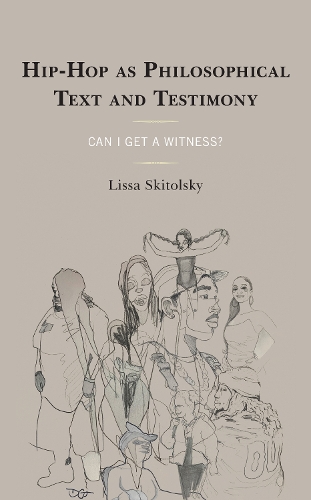
Hip-Hop as Philosophical Text and Testimony: Can I Get a Witness
(Paperback)
Available Formats
Publishing Details
Hip-Hop as Philosophical Text and Testimony: Can I Get a Witness
By (Author) Lissa Skitolsky
Bloomsbury Publishing PLC
Lexington Books
20th May 2022
United States
Classifications
Professional and Scholarly
Non Fiction
Social and cultural history
Popular music
306.08996073
Physical Properties
Paperback
208
Width 154mm, Height 220mm, Spine 16mm
318g
Description
Hip-hop as survivor testimony Rhymes as critical text Drawing on her own experiences as a lifelong hip-hop head and philosophy professor, Lissa Skitolsky reveals the existential power of hip-hop to affect our sensibility and understanding of race and anti-black racism. Hip-Hop as Philosophical Text and Testimony: Can I Get a Witness examines how the exclusion of hip-hop from academic discourse around knowledge, racism, white supremacy, genocide, white nationalism, and trauma reflects the very neoliberal sensibility that hip-hop exposes and opposes. At this critical moment in history, in the midst of a long overdue global reckoning with systemic anti-black racism, Skitolsky shows how it is more important than ever for white people to realize that our failure to see this systemand take hip-hop seriouslyhas been essential to its reproduction. In this book, she illustrates the unique power of underground hip-hop to interrupt our neoliberal and post-racial sensibility of current events.
Reviews
Skitolsky explores how underground hip-hop generates philosophical value as critical theory and anti-racist practice, based on its subversive production of subjugated knowledge. Examples drawn from work by N.W.A., Tupac Shakur, KRS-One, and Public Enemy demonstrate the power of hip-hop as a culture bearing witness to and resisting the infliction of anti-Black violence in every social and political institution in the United States" (p. 1). Skitolsky's blistering analyses explore the normalization of systemic racism and how hip-hop is politically significant as a form of testimony" (p. 12). She convincingly argues for the genre's therapeutic value by asserting that hip-hop is the only form of popular culture that testifies to the traumas suffered from being-black in America" (p.14). The author draws on cultural theorists Paul Taylor, Charles Mills, George Yancy, and Audre Lorde (as well as Du Bois, Foucault, and Lacan) to portray and indict a white sensibility that is sustained by the refusal to ask specific kinds of questions or analyze taken-for-granted assumptions (p. 7) in relation to political inequalities. Skitolsky provides careful consideration of PTSD as a ground of Black life and a detailed critique of scholarly refusals to encompass Black social death within genocide studies. Highly recommended. Lower-division undergraduates through faculty; professionals.
* Choice *Like Rakims legendary ink, the thoughtfulness of Lissa Skitolskys Hip-Hop as Philosophical Text and Testimony: Can I Get a Witness makes the reader think as her penetrating analysis sinks into their consciousness. A deeply personal, passionate, and provocative look at the aural, psychological, and political power of Hip-Hop, this work brings a devoted (Hip-Hop) heads amped perspective and challenging voice to philosophy, aesthetics, and hip-hop studies.
-- Charles Peterson, Oberlin College"Lissa Skitolsky brings palpable passion and revelatory philosophical vision to this exploration of what hip-hop can teach us about our different experiences of this unequal world. Admirably devoted to celebrating the artform's ability to expose the institutional and psychological dimensions of anti-black racism, Skitolsky's argument that hip-hop can help us better understand post-traumatic stress disorder is especially eye-opening."
-- Chike Jeffers, Dalhousie University"Lissa Skitolsky has written the rare study in the philosophy of culture that reflects the vibrancy of its subject. This is essential reading for anyone interested in the politics and aesthetics of Hip-Hop Nation!"
-- Paul Taylor, Vanderbilt UniversityAuthor Bio
Lissa Skitolsky is the 2020-2021 Simon and Riva Spatz Visiting Chair in Jewish Studies at Dalhousie University.
